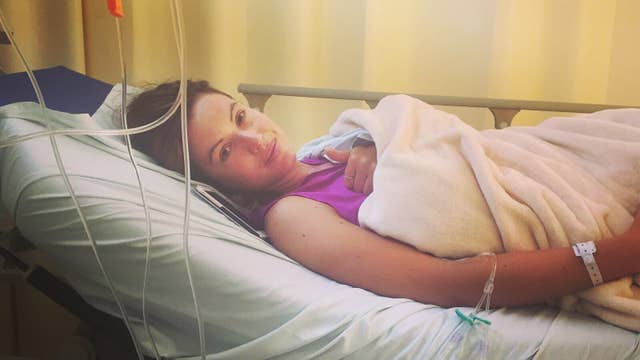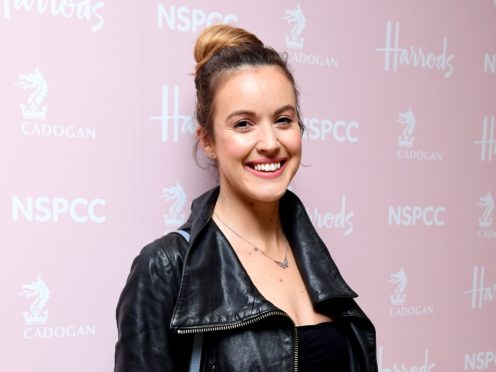Sports presenter Charlie Webster has told of the lasting effects malaria will have on her body, including having to cut out alcohol and salty foods for the rest of her life.
The 36-year-old, who nearly died in 2016 after contracting a rare form of malaria while in Rio de Janeiro for the 2016 Olympics, said she is determined not to be debilitated by concerns that her kidneys may fail in the future.
Webster became unwell after taking part in a 3,000-mile charity cycle ride to the Brazilian city, where she was due to work as an official Team GB presenter.
She was put into a medically induced coma and doctors initially feared she would die.

Nearly three years on, Webster said she will forever face kidney problems, as well as mental health issues, and is calling for people to sign a voice petition to eradicate the disease forever.
The TV presenter told PA: “I’ve got permanent kidney problems and I have to be careful, especially when I do sporting events.
“About a year ago I got bad results for my kidneys and my liver and I came out of the hospital and broke down in tears.
“I was so frustrated, I was so angry, because I was really healthy before – which is one of the reasons I survived – and I was like, no, hang on. They said I wasn’t going to survive and I survived, so this is not going to debilitate me.
“The doctors still don’t know enough about the damage caused to my kidneys, so they could last forever or they could fail down the line.
“But I didn’t survive to sit here worrying ‘Oh no, my kidneys might fail tomorrow’.”
Webster said she is no longer allowed to drink alcohol because it could put her permanently-damaged kidneys under “too much pressure”.
“Diet-wise, it’s mainly salt I can’t have, which is really hard because I’ve not got a sweet tooth, I’ve got a salt tooth,” she added.
“Whenever I have too much salt I swell up and feel really sick.”
She is also not allowed to take ibuprofen or any anti-inflammatory drugs, nor antibiotics, even if she has an infection.
The broadcaster said she wished there had been more emphasis on the impact that her near-death experience and ongoing recovery has had on her mental health.
She said: “You’re working on the physical stuff during recovery andwhat I found difficult was, when I first went back into things, everybody told me I looked so well.
“I knew they were just trying to be nice but they had no idea what was going on in my head. The torment, the stress.”
Of dealing with PTSD, she said: “I knew I needed help. I was getting so much physical help and I knew I needed mental health help to deal with this.”
She said she signs up to challenging sporting events, including a gruelling race across the Alps last weekend and the London Marathon in April, to help her mental health.
Having experienced the effects of malaria herself, Webster said she wants people to understand that the disease is more than just a health issue, and that it is also strongly linked to gender equality problems around the world.
An ambassador for the charity Malaria No More UK, she said: “Malaria prevents people from going into education, from becoming decision-makers. Women and girls are more susceptible to the disease due to pregnancy.
“If we want to have a positive impact on this world, we need to include malaria into the conversation of education and gender equality.”
She added: “Sometimes we’re so narrow-minded in the way we think about problems, but everything is interlinked – you don’t just get malaria and that’s that. It impacts everything.
“Each of those deaths are people that can have a positive impact on international development, which is what we’re trying to tackle at the moment as a global community.”
Just seen this powerful short film for #MalariaMustDie starring @hughlaurie, @ncutigatwa, @MissDumezweni, @emelisande and #PeterCapaldi. Join us and speak up to end malaria. https://t.co/AGFZPpejMJ pic.twitter.com/KuGdGfdC6t
— Charlie Webster (@CharlieCW) June 27, 2019
Webster is supporting the campaign Malaria Must Die, So Millions Can Live and its new voice petition, backed by stars including Hugh Laurie, Emelie Sande and Peter Capaldi.
Launched by David Beckham earlier this year, the voice petition calls for people to speak up for those who need help and join the world’s first voice petition to end the disease.
The voice petition will be crafted into a sound sculpture to grab the attention of world leaders ahead of the Global Fund’s meeting in Lyon, France, in October.
The Global Fund, which provides almost 60% of all international financing for malaria worldwide, aims to raise at least 14 billion US dollars (£11 billion) to help the global fight against malaria, tuberculosis and Aids.
Add your voice to the voice petition at malariamustdie.com.
